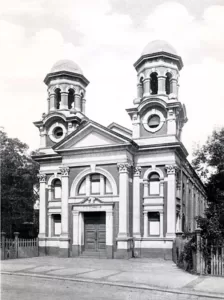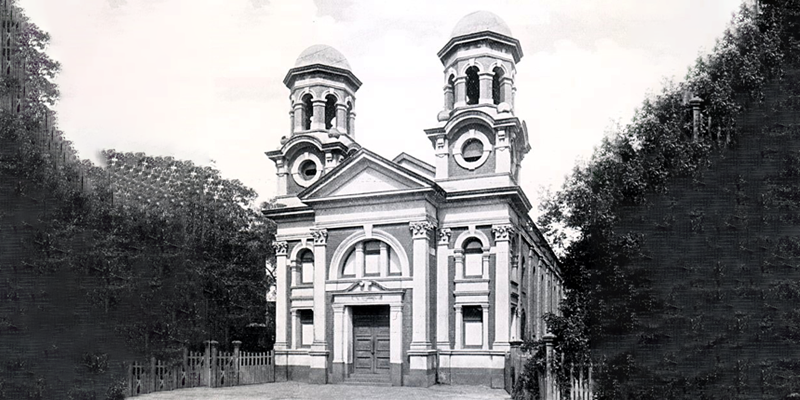From Australia’s Jewish Past:
Elias Blaubaum
Reverand and publisher
First published in J-Wire April 4, 2023
Elias Blaubaum was a most inspirational and outstanding member of the Melbourne Jewish Community as Minister of the St Kilda Hebrew Congregation for thirty-one years and editor of the Jewish Herald for almost twenty-five.
Elias was born on 19 November 1847 to Aaron and Miriam, an orthodox family living in Rotenburg, a country town on the River Fulda in Hesse-Kassel, Germany. Their family name – Blaubaum – meaning ‘’blue tree’’ may have been derived from the distinguished shield outside their home, which was a common practice among Jews in that part of Germany who adopted family names prior to them being made by law.
Elias was a gifted scholar and persistent student, graduating around 1870 from the Royal Provincial College of Kassel, where he appears to have trained as a teacher. Following his graduation, he became the Assistant Minister and Hebrew Teacher at Gudensberg, a little town in the Kassel region. In 1873 Melbourne businessman Isaac Hallenstein, who was traveling through Europe, interviewed Elias for the position of St Kilda Synagogue’s first minister.
Elias was twenty-five at the time, slight in stature, dark, attractive, and unmistakably ‘’Semitic. He was not an ordained rabbi, but his three years’ experience at Gudensberg was sufficient to persuade a rather desperate St Kilda congregation, which had been searching for a suitable minister for months, to accept Isaac Hallenstein’s recommendation that Elias be appointed.
He left Germany in October 1873 and traveled to London for an audience with the Chief Rabbi of the British Empire, Nathan Marcus Adler. At the time, he did not know a word of English, but during the long voyage to Port Melbourne, where he arrived on 23 December 1873, he’d taught himself enough to be understood.
During his travels, he kept a journal. He wrote in German at the beginning, then, towards the end, in English. Within a few months, he was able to deliver his first weekly Shabbat sermon in English.
He felt it was a duty and a pleasure to share with others what he had learned. He would always say ‘’improve yourself! And in doing this, endeavour to improve others!’’
He had a deep sense of history and was always very conscious of his ministerial role as a teacher of Judaism, whose task it was to hand on his heritage to the next generation. He always exhibited himself as a learned and cultured German gentleman as well as a proud and passionate Jew. He did not believe that the conferral of civil rights upon Jews obligated them to dilute their Jewishness. His belief was that the acquisition of rights of which their forefathers never dreamed to be the case should be the responsibility of a Jew to hold on to their ancestral religion. He was impressed with the attitude shown by the established Australian Jewish community, with its pursuit of integration without assimilation, and its resolve to resist both the honey and the sting of the wider society.

In 1885 Rabbi Dr Joseph Abrahams arrived in Victoria and very quickly became one of Elias’s most devoted admirers, remarking that he had never met anyone with such “restless energy”. It was always Elias’s desire for improvement in everything that he did. At the end of each year, his aim was to be able to answer the question satisfactorily, “Am I richer in knowledge and good deeds than I was twelve months ago?” Indeed, every evening, he wished to look back on something attempted, something done, to the glory of God and the well-being of his fellow creatures.”
In 1877 Elias married Agnes Cohen, the daughter of Samuel and Eliza Cohen of East Melbourne. The couple settled in St Kilda, where they lived with their seven children – two girls to be followed by five boys. Agnes passed away in 1892 when the youngest child was still a baby. Elias never remarried. Their children were all academically talented, and as a devoted father, he gave up a great deal to ensure that the children could be well-educated.
He encouraged them all to pursue careers that would benefit humanity. One son was unfortunately killed in France during the First World War. Two of his sons married out of Judaism, and it is sad to note that the entire male line of the family ceased to be Jewish by the next generation. It was an ironical twist of fate for the descendants of a man who strove to make young Jews “proud of their lineage and conscious of their religion” and who had declared that “we are not now so often exposed to the shame of seeing our men of intellect and ability abandon their inheritance for a mess of pottage.” The situation was a salutary reminder of the fragile ties binding Jews to their heritage in Australia’s easy and tolerant society during the first half of the twentieth century. Elias was also a staunch and outspoken believer in the equality of women and their right to social emancipation, higher education and economic independence.
In December 1879, at the age of thirty, Elias established the Jewish Herald, having been able to influence a consortium of six Jewish businessmen to provide the funds to establish the paper. It was in his position as an editor that his moral and intellectual greatness became apparent, and Elias was very proud of the Herald’s high journalistic reputation. However, his strong personality brought him his share of opponents and detractors, and the Jewish Herald conceded as much when, in an unattributed obituary for him, it observed that no man who ever lived was entirely free of enemies.
In 1880 he introduced into the St Kilda Synagogue an annual ceremony for the confirmation of girls, and he did not use the term Bat Mitzvah. He was also an active member of the Anglo -Jewish Association and, in 1885, was instrumental in the establishment of the Montefiore Homes for the Aged and Infirmed.
In 1902 Elias’s health began to deteriorate, and, accompanied by his eldest daughter, he left Melbourne in 1903 on a nine-week vacation to Sydney, the Pacific Islands and New Zealand. From each place on his route this incredible, although dying man, sent long, entertaining and informative articles back to Melbourne for inclusion in the Jewish Herald. They showed that ill as he was, his writing of social and historical documents had lost none of its verve and vigour. They give more than a tourist’s superficial impressions and provide a vivid and valuable insight into Pacific life and administration at the turn of the century.
He returned from his travels refreshed and apparently cured. However, his illness was more serious than his doctor imagined. He had an obstructive tumour of the bladder and, in April 1904, was admitted to hospital where he underwent surgery. Whilst the surgery was considered to have been a success, it was less than a fortnight later, at the age of fifty-six on 21 April 1904, that Elias passed away.
An anonymous obituarist wrote that even those who had crossed swords with Elias must agree that he was “a good man and a good Jew.” Rabbi Abrahams recalled that Elias’s “efforts were not showy or ostentatious, but modest, quiet and practical.” His lasting legacy was the Jewish Herald. The quarter-century issues which he edited were an indispensable source for the history of Australian Jewry. They illustrate the timelessness of Judaism and remind us that its adherents can communicate not only across continents but across centuries. They help us to understand ourselves, for their pages consider the sorts of problems and issues which our Jewish community is confronting today. The busy pen of Elias Blaubaum can still instruct and inspire.
Acknowledgements
- The Australian Dictionary of Biography;
- AJHS, Vol. 9 P.8 1985 – Dr Hilary Rubenstein;
- St Kilda Synagogue article by John Cohen – The Chronicle 1997.

